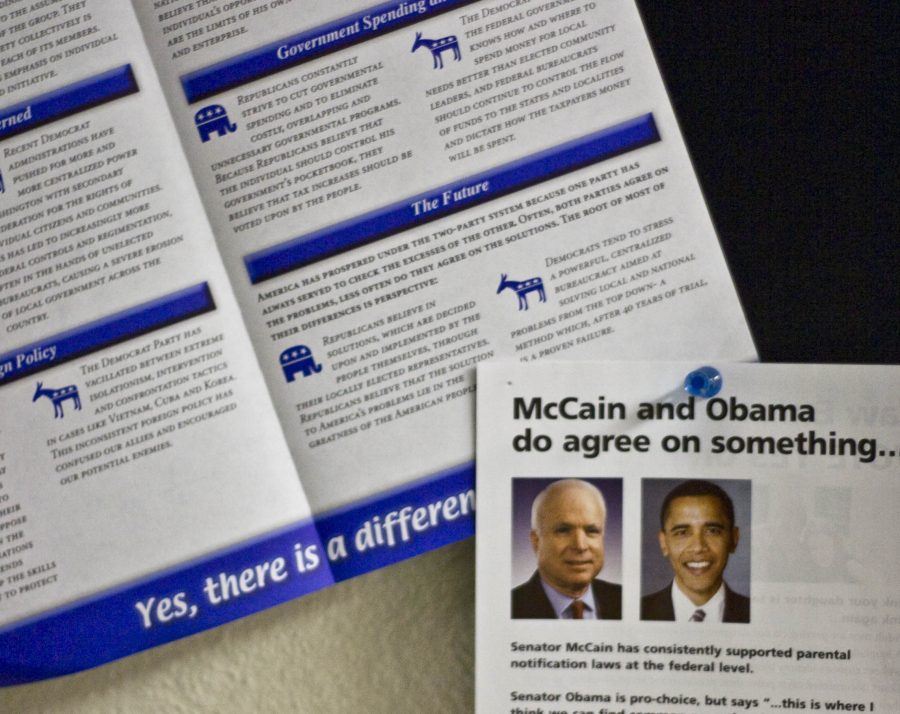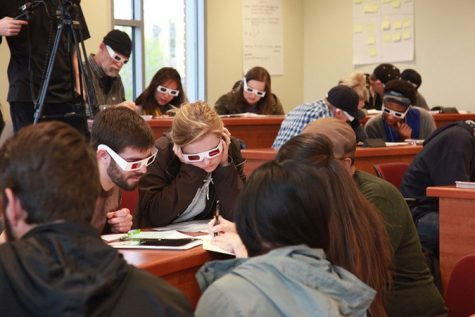Learn your props
The most controversial California propositions are explained in-depth. Find out what it means to vote yes or no on the proposition concerning abortion, gay marriage and non-violent offenders.
Voter guides and proposition information sheets have been arriving all around campus in recent weeks. Photo by Kelsey Heng
October 16, 2008
Prop. 4: Abortion Waiting Period and Parental Notification
What’s it about?
If Proposition 4 is passed, the California State Constitution will require a 48-hour waiting period before a minor can have an abortion. In that time, physicians must notify the parents of the minor through either personal notification or certified mail notification.
Notification can then be transferred to an adult family member if the minor provides a written statement saying she fears physical, sexual or emotional abuse based on past history from a parent. Abortion physicians will need to have reports made of the operation and be responsible to pay damages if they violate the requirements.
An exception for notification is made if the abortion is an emergency or the minor has her parents’ permission. The courts can also make exceptions if they find the minor to be mature enough to raise a child. Lastly, the proposition guards against abortion coercion.
Minors currently receive abortion services to the same extent as adults, including minors in various state tax-funded health care programs, such as the Medi-Cal health care program for low-income individuals, according to the California Voter Guide.
This parental notification initiative is the third in the past four years on which voters will be asked to decide. Previous laws on notifications have been struck down in court.
For
While it may seem like an anti-abortion measure, there are some who believe that the proposition can greatly benefit the state’s teen pregnancy rates. If it garners enough votes, “Proposition 4 would bring California in line with 34 other states where similar rules have a proven track recording of decreasing teen pregnancy and sexually transmitted infections,” wrote Margaret Pearson of the L.A. Times.
Supporters argue that parental knowledge of an abortion will help them give proper medical attention if complications arise.
Moreover, Proposition 4 would allow “someone who knows the girl and cares about her future [to] help her understand all her options,” reads a statement on www.YesOn4.net.
Against
Opponents say teens who are scared to tell their parents about plans to abort may have unsafe, back-alley abortions or even commit suicide.
Additionally, some Californians feel that the proposition is a violation of the minor’s privacy. Francesca Ratner of the L.A. Times believes that “selling Proposition 4 as just a ‘parental notification’ is dishonest.” Furthermore, the San Francisco Chronicle states that the experiences of physicians “suggest its requirements are unnecessary — and even insidious.”
Prop. 5: Nonviolent Offender Rehabilitation
What’s it about?
If passed, Proposition 5 will change how California handles the convictions of nonviolent drug offenses. As explained in the official voter information guide, Proposition 5 will expand drug treatment and parole programs, dramatically reducing the number of drug offenders sent to prison. It will also change existing laws concerning state administration over drug rehabilitation and parole programs.
Prison sentences will be shortened for drug offenders participating in drug treatment programs and therapy. Court authority to imprison drug offenders will be limited. While significantly shortening parole for most drug offenders, Proposition 5 will increase parole for other violent crimes.
The possession of less than 28.5 grams of marijuana will change from a misdemeanor to an infraction. A new three-track program will be implemented to divert offenders from entering prison immediately, thereby decreasing sentencing through participation in drug therapy programs. These programs will receive funding from the Substance Abuse Treatment Trust Fund, as written in the official voter information guide.
For
As quoted in the Los Angeles Times, the Drug Policy Alliance Network calls Proposition 5 “the most ambitious sentencing and prison reform in U.S. history.” Despite criticism that Proposition 5 is a “get out of jail free card,” the Times says supporters are calling it “the most sensible approach to drug offenses.”
Treatment specialist John de Miranda sees Proposition 5 as the right solution for California’s drug problem.
“Proposition 5 would expand access to substance abuse treatment for young people and nonviolent offenders. It will create a path to long-term recovery for tens of thousands of Californians each year,” he writes in his San Diego Union-Tribune article.
Against
Opponents of Proposition 5 believe it will be too expensive and provide a perfect opportunity for criminals to take advantage of the state. Martin Sheen, actor and political activist, avidly opposes Proposition 5.
“Proposition 5 would cripple successful rehabilitation programs and dramatically limit the power of drug-court judges to help those who need it most,” he wrote in his Sacramento Bee opinion article. “It will take limited resources away from proven programs and waste them on mandated programs that have already been shown to be failures.”
Prop. 8: Eliminates Right of Same-Sex Couples to Marry
What’s it about?
With a combined price tag of $41 million, the warring Proposition 8 campaigns have pulled out the fiscal stops in a fight for voter opinion on same-sex marriage.
If Proposition 8 is passed, a new section of the California constitution would read, “Only marriage between a man and a woman is valid or recognized in California.”
A similar ballot initiative was passed in 2000 with 61 percent of California voters agreeing. However, the definition of marriage is again on the ballot, this time as a constitutional amendment in order to be immune from court attacks. Since a May court ruling, same-sex marriage has been legal in California.
The hot-button issue has split opinions within families, denominations and even political parties as evidenced by two campaign parties – with two, different-colored wedding cakes – at the recent California Republican Party convention. The parties, positioned across the hall from each other, were civil yet firm on their reasons to support or oppose Proposition 8.
For
At one party, champagne glasses clinked with Proposition 8 supporters’ toasts to traditional marriage around a large white cake at the wedding reception-themed event. The top three reasons to vote yes on Proposition 8 from www.ProtectMarriage.com are:
1) It restores the definition of marriage to what the vast majority of California voters already approved and human history has understood marriage to be.
2) It overturns the decision of four activist Supreme Court judges who ignored the will of the people.
3) It protects children from being taught in public schools that “same-sex marriage” is the same as traditional marriage.
Against
Across the hall, luau attendees donned leis and party hats and turned up the beach music while mingling with piña coladas and chocolate cake in hand. Their top three reasons to oppose Proposition 8 come from www.NoOnProp8.com:
1) The law of the land should guarantee the same freedoms and rights to everyone – no one group should be singled out to be treated differently.
2) The nation was founded on the principle that all people should be treated equally. Equal protection under the law is the foundation of American society.
3) Marriage is the institution that conveys dignity and respect to the lifetime commitment of any couple. Proposition 8 would deny lesbian and gay couples that same dignity and respect.







